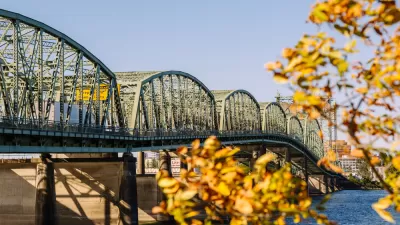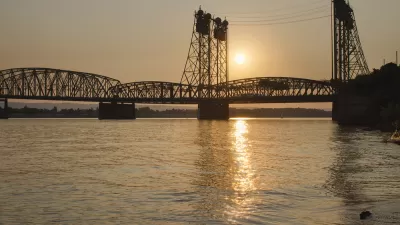Bloomberg Businessweek examines the failed Columbia River Crossing project as a poster child for how political dysfunction is derailing critically needed infrastructure.
Peter Robinson recaps the details of a project that came to its demise in March of 2014: "After spending $200 million in state and federal money on surveys and designs, lawmakers in Oregon and Washington scuttled the proposed Columbia River Crossing, a project backed by the governors of both states."
The article blames the failure of the project on both "Tea Party conservatives" and "left-wing environmentalists." According to Robinson, "[it] also reflects the inability of the Obama administration to influence state legislators when it comes to replacing crucial national infrastructure."
Robinson goes on to describe the costs of maintaining the status quo, which includes huge costs for retrofitting the bridge to current seismic standards as well as unknown opportunity cost from economic development.
[Updated with the correct year for the end of the project.]
FULL STORY: How Local Politicians Scuttled a Crucial Federal Bridge Upgrade

Planetizen Federal Action Tracker
A weekly monitor of how Trump’s orders and actions are impacting planners and planning in America.

Chicago’s Ghost Rails
Just beneath the surface of the modern city lie the remnants of its expansive early 20th-century streetcar system.

San Antonio and Austin are Fusing Into one Massive Megaregion
The region spanning the two central Texas cities is growing fast, posing challenges for local infrastructure and water supplies.

Since Zion's Shuttles Went Electric “The Smog is Gone”
Visitors to Zion National Park can enjoy the canyon via the nation’s first fully electric park shuttle system.

Trump Distributing DOT Safety Funds at 1/10 Rate of Biden
Funds for Safe Streets and other transportation safety and equity programs are being held up by administrative reviews and conflicts with the Trump administration’s priorities.

German Cities Subsidize Taxis for Women Amid Wave of Violence
Free or low-cost taxi rides can help women navigate cities more safely, but critics say the programs don't address the root causes of violence against women.
Urban Design for Planners 1: Software Tools
This six-course series explores essential urban design concepts using open source software and equips planners with the tools they need to participate fully in the urban design process.
Planning for Universal Design
Learn the tools for implementing Universal Design in planning regulations.
planning NEXT
Appalachian Highlands Housing Partners
Mpact (founded as Rail~Volution)
City of Camden Redevelopment Agency
City of Astoria
City of Portland
City of Laramie




























